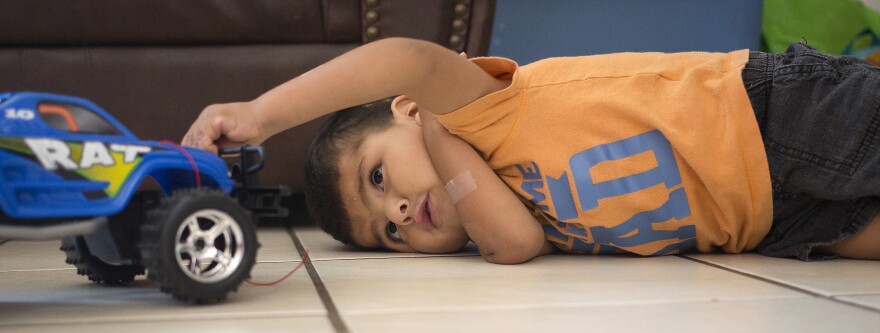Correction: An earlier version of this story suggested the cuts were imminent and would be going into effect July 15. Due to a Texas Supreme Court ruling, those cuts are temporarily on hold. We regret the error.
Groups who provide therapy to children with developmental issues are slated to receive less money from the state for those services. That’s thanks to a slew of cuts approved by the Texas legislature last year. For now those cuts are temporarily on hold, thanks to a Texas Supreme Court ruling last week.
Still, if these cuts to Medicaid reimbursement rates for providers in the Early Childhood Intervention program prevail, they could be particularly devastating because some families have seen some dramatic improvements in their children thanks to the program.
About four years ago, Mayra Reyes was pregnant with her son Gerardo. She was well into her second trimester and she went to see a doctor. And – unfortunately -- she got some bad news.
“When I was five months they told me Gerardo had hydrocephalus and spina bifida,” Reyes says. “So, we didn’t know what the outcome would be”
The prognosis was not good at all. In fact, when he was born doctors said Gerardo didn’t have enough brain tissue and likely wouldn’t live very long.
“The doctor told me ‘If I were you, I would just take him home, give him all of our love spend the time you can with him because it could be days, weeks, months, not even a year, that you are going to have Gerardo,'” Reyes recalls.
“We are already working on a gap…so, this just spreads that gap even further.”
The family was sent home with hospice, but as Reyes puts it, Gerardo hasn’t gone anywhere. Three and a half years later, Gerardo is still here. It hasn’t been easy, but after multiple surgeries he’s surpassed what all his doctors expected.
“I mean he’s overcome a lot they told us that if he lived he’d be a vegetable kid and if you see Gerardo, Gerardo loves to talk to sing,” Reyes says.
Gerardo is a ball of energy. He darts around the living room, talks and grabs things from people’s hands.
“Part of Gerardo being the way he is it’s because also Any Baby Can came along when he was three months,” she says.
Any Baby Can is what Reyes says was a game-changer in Gerardo’s life. When he three months old, Medicaid started paying for therapies aimed helping him overcome some of his developmental issues. Reyes is an attentive mother – she says her commitment to treating Gerardo like a regular child is why he’s doing so well. However, she says this would have been nearly impossible without the therapists.
“Things that maybe us as parents can’t do – the therapists can show us,” she explains. “Or maybe as we are going through the process learning with them, too. That is awesome because there might be things as parent that are like, ‘Oh, I didn’t know that.’”
Reyes learned different stretches and exercises to do with Gerardo. And all of it was paid for by Medicaid. And this entire program – which is called Early Childhood Intervention—is about to go through a big shakeup. Lawmakers cut $350 million from it last year. Providers sued the state to try to stop the cuts—but they lost. However, the Texas Supreme Court put them on hold temporarily. So, this issue will be revisited once more.
“I think it is potentially the make or break for a lot of people,” says Chris Adams, the Chief Financial Officer for Any Baby Can, the non-profit group that helped Gerardo.
"When there are reductions in Medicaid reimbursements, there are no accompanying reductions in the number of children we are required to serve."
Adams says his group provides similar services to roughly 550 families in Central Texas every year. Medicaid makes up 70 to 80 percent of those cases. And Adams says they have been suffering through big cuts to their Medicaid contracts for years. Usually they seek out donations to make up for it, but that’s getting harder.
“We are already working on a gap that we have to make up with philanthropic dollars,” Adams says. “So, this just spreads that gap even further – to a point where for some it will break the bank because there is no further that they can stretch.”
Besides non-profits like Any Baby Can, there are some for-profit groups who also provide these services – which, by the way, are federally mandated.
“So when there are cuts to the contract, when there are reductions in Medicaid reimbursements, there are no accompanying reductions in the number of children we are required to serve,” explains Andy Miller, the President and CEO of Any Baby Can.“There are no reductions in the amount of services that we will be required to provide. Because it is really outcome based for the child."
Miller says this means some providers will have to make tough decisions – including the decision whether to shut down. And that, he says, we will hurt rural areas the most because they didn’t have a lot of options to begin with. And Miller says end up paying for that anyway.
“So, we can wait and under-perform in serving children zero to three,” Miller says. “Wait until they get into school and then spend more money and more resources to try and ensure that they are successful. And what we know is that those interventions are more difficult and have less likelihood of success than if we were to intervene in those first three years.”

And advocates say they would have pointed this out if they were asked about these cuts when they were proposed last year. But the cuts were influenced by a Medicaid payment study, not stakeholders.
Anne Dunkelberg with the left-leaning Center for Public Policy Priorities has a major problem with that study. She says access wasn’t even a factor when they calculated those new rates.
“Obviously, a rate analysis that doesn’t take into account what a rate cut would do to access to care probably didn’t finish the job,” she says.
Dunkelberg says the way they did this also didn’t leave a lot of room for flexibility in case problems come up. So, the hope now is for advocates to convince lawmakers to reverse the cuts during the legislative session that starts in January. Dunkelberg says for providers who rely on Medicaid reimbursements this is a familiar story.
“You know, too often it is a case of a little bit of overreach from the legislature – they cut too deep and then they hear about it,” Dunkelberg explains.
KUT reached out to two lawmakers that oversee Medicaid budgets in the state – Republican State Representative Four Price and Republican State Senator Charles Schwertner – but neither office replied to a request for comment.
Even so, advocates are going to have to make their pitch at a time when there’s less tax revenue coming into Texas because of relatively low oil prices. Because of that decline in money, other agencies are already clamoring for more funding.







